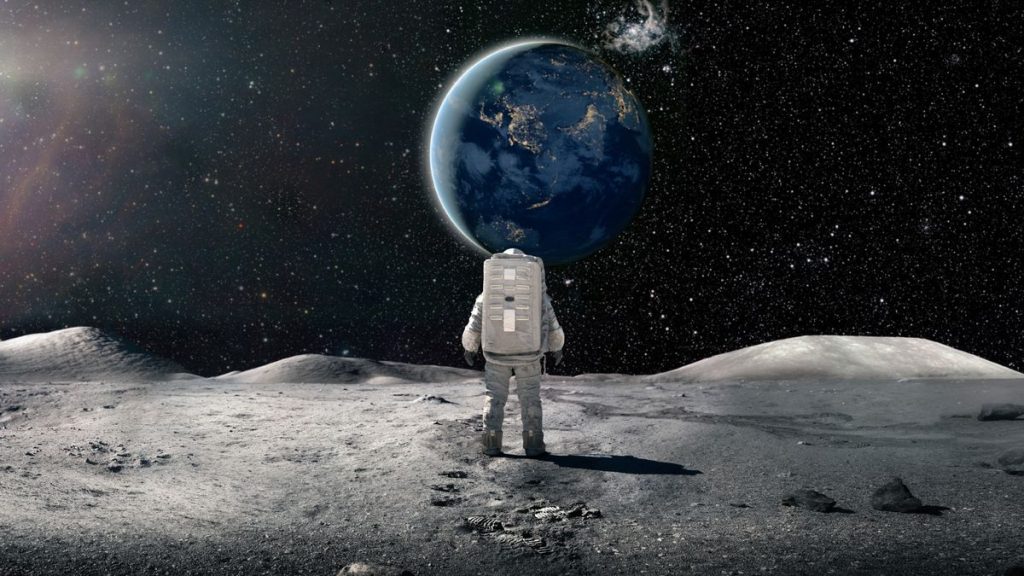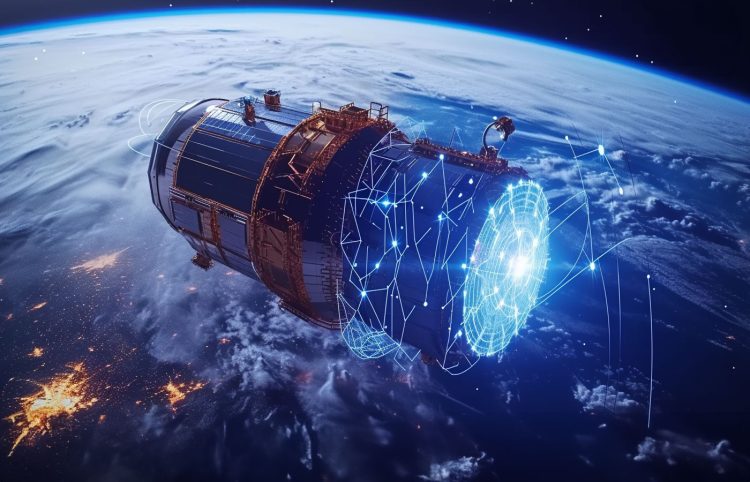Introduction: The Growing Role of Artificial Intelligence in Space Exploration
As the exploration of space continues to advance, humanity is encountering new challenges and opportunities that require innovative technological solutions. Artificial intelligence (AI) is emerging as one of the most promising tools to overcome these challenges and improve the efficiency, safety, and autonomy of space missions. From autonomous spacecraft navigation to the analysis of vast datasets collected from deep space, AI is transforming how we explore the cosmos. Historically, space exploration relied on direct human control from Earth, with spacecraft, rovers, and satellites responding to commands from mission control. However, the distances involved, the need for real-time decision-making, and the increasing complexity of missions are pushing the boundaries of traditional systems.
Today, AI has become integral to the future of space exploration. AI systems are capable of learning from data, adapting to new environments, and making decisions without human intervention. The growing role of AI in space exploration is particularly important in scenarios where human presence is not feasible or practical—such as on distant planets, moons, or in deep space. By enhancing autonomous capabilities, reducing the need for constant communication with Earth, and streamlining operations, AI is poised to revolutionize space missions. This article will explore the various ways in which AI is being utilized in space exploration, including autonomous navigation, AI-powered space robotics, machine learning for data analysis, and future space missions where AI will be at the forefront of decision-making.
AI for Autonomous Navigation: Assisting Spacecraft in Autonomous Navigation and Mission Control
Autonomous navigation is one of the most exciting applications of AI in space exploration. Spacecraft are often sent on long-duration missions to distant planets, moons, or deep space, where communication delays can range from minutes to hours. This delay makes real-time communication between Earth and spacecraft impractical for timely decision-making. AI is providing spacecraft with the ability to navigate autonomously, analyze their surroundings, and make real-time decisions to optimize their trajectories.
Autonomous navigation systems use AI to process data from sensors, cameras, and onboard computers. These systems rely on machine learning algorithms to adapt to new environments and make decisions about how to adjust the spacecraft’s position, speed, and orientation. For example, NASA’s Perseverance Rover, which landed on Mars in 2021, uses AI to autonomously identify safe landing sites, navigate difficult terrain, and avoid obstacles. The rover’s AI system processes images from its cameras, identifies obstacles like rocks or craters, and adjusts its path accordingly—without requiring input from Earth-based controllers.
In addition to improving navigation, AI helps spacecraft optimize fuel consumption, predict potential system failures, and maintain stability during the course of a mission. This level of autonomy allows spacecraft to perform their tasks more efficiently, especially in missions where real-time communication with Earth is not feasible due to the vast distances between Earth and the spacecraft. As AI continues to improve, future space missions will rely even more on autonomous navigation to achieve mission objectives with minimal human intervention.
AI in Space Robotics: The Use of Robots Powered by AI for Exploration and Maintenance in Space
Space robotics powered by AI is another critical area where artificial intelligence is making a significant impact on space exploration. Robots are used in various capacities, from planetary exploration to space station maintenance. In the past, robotic systems were largely teleoperated by humans from Earth. However, AI-powered robotics are now capable of performing tasks autonomously, making them more effective and reliable in environments where human presence is limited or impractical.
AI-driven robots are equipped with sensors, cameras, and advanced algorithms that allow them to perceive and understand their environment. These robots can execute complex tasks, such as collecting samples, performing repairs, and assembling structures. The use of AI enables these robots to make decisions based on their surroundings, adapt to unexpected conditions, and optimize their actions.
A prime example of AI-powered space robotics is NASA’s Robonaut, designed to assist astronauts in performing tasks on the International Space Station (ISS). Robonaut is capable of performing basic tasks autonomously and can be operated remotely by astronauts when necessary. Additionally, AI-powered robots like the Canadian Space Agency’s Dextre robot on the ISS can assist with delicate repairs and maintenance tasks, reducing the need for astronauts to conduct spacewalks, which can be dangerous and time-consuming.
AI-powered robotics will play a key role in future deep-space exploration missions, where the human presence will be even more limited. For example, in the coming decades, AI-powered rovers could be used to explore the surface of the Moon, Mars, or even asteroids. These robots could collect scientific data, search for signs of life, and carry out maintenance on lunar or Martian bases, all while functioning autonomously.
Machine Learning for Data Analysis: How AI Algorithms Process Vast Amounts of Space Data
Space exploration generates massive amounts of data—images, sensor readings, telemetry, and other measurements—many of which need to be analyzed in real time. AI and machine learning algorithms are becoming essential tools in processing and interpreting this data. Traditional methods of data analysis often rely on human experts to sift through terabytes of information, which can be time-consuming and inefficient. AI, on the other hand, can analyze large volumes of data quickly and accurately, identifying patterns and trends that might be difficult for humans to discern.
Machine learning models, particularly deep learning networks, can be trained to recognize specific features in space data, such as identifying objects of interest in images taken by telescopes or spacecraft. For example, NASA’s Jet Propulsion Laboratory has used AI algorithms to analyze data from the Mars Curiosity Rover, which has identified potential areas for further exploration based on patterns in the rover’s sensor data. Similarly, AI-powered systems have been used to analyze data from the Hubble Space Telescope, identifying galaxies, nebulae, and other celestial bodies in unprecedented detail.
AI is also being used to assist with the detection of exoplanets. Through machine learning algorithms, scientists are able to process light curves collected by space telescopes like Kepler, identifying tiny fluctuations in the brightness of stars that suggest the presence of planets orbiting those stars. In this way, AI has played a key role in the discovery of thousands of exoplanets, many of which are potentially habitable.
Furthermore, machine learning is also playing a pivotal role in identifying potential hazards in space, such as asteroids or space debris. AI algorithms can analyze trajectories and predict the likelihood of collisions, helping mission planners avoid potential threats and protect spacecraft.

AI-Powered Space Missions: Future Missions Where AI Will Play a Key Role in Decision-Making
As AI continues to evolve, its role in space exploration will expand, enabling entirely new forms of mission design and execution. Future space missions—whether manned or unmanned—will rely increasingly on AI systems to assist in mission planning, decision-making, and real-time problem solving.
One of the most promising future applications of AI is in deep-space missions. For example, AI could be used to autonomously control spacecraft on long-duration missions to destinations like Mars, Europa, or beyond. In these missions, spacecraft may need to make critical decisions about navigation, energy usage, scientific operations, and communication with Earth. AI will allow these spacecraft to adapt to unforeseen conditions, such as hardware malfunctions or unexpected cosmic events, without waiting for instructions from Earth-based mission control.
Another potential application of AI in future missions is in the area of human space exploration. As humans venture beyond low Earth orbit—towards the Moon, Mars, or even interplanetary travel—AI will play a critical role in supporting astronauts. AI systems will be integrated into spacecraft, rovers, and habitats, assisting with navigation, monitoring astronaut health, and providing real-time decision-making support. For example, AI could be used to monitor the environment of a Mars base, making autonomous decisions to regulate life support systems, manage energy consumption, and ensure the safety of the crew.
AI is also expected to play a role in the search for extraterrestrial life. In missions designed to explore icy moons like Europa or Enceladus, AI-powered systems could analyze subsurface oceans and surface features, identifying potential biosignatures or signs of microbial life without direct human intervention.
Conclusion: The Transformative Potential of AI in Making Space Exploration More Efficient and Autonomous
The potential for artificial intelligence to enhance space exploration is vast and transformative. AI is already playing a crucial role in the autonomous navigation of spacecraft, powering space robotics, and analyzing the immense datasets generated by space missions. As we continue to explore deeper into space, the need for AI will only increase. The challenges posed by the vast distances, harsh environments, and complex operations of space exploration require the kind of autonomous, real-time decision-making that AI excels at.
In the future, AI will enable us to send spacecraft on longer missions, explore more distant worlds, and conduct more efficient scientific research. It will allow us to overcome the limitations of human presence and communication delays, making space exploration more autonomous, efficient, and reliable. Ultimately, AI will not only assist in space exploration but will be a driving force behind the next era of discovery—one that could unlock the mysteries of our solar system and beyond.











































Discussion about this post